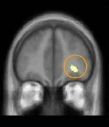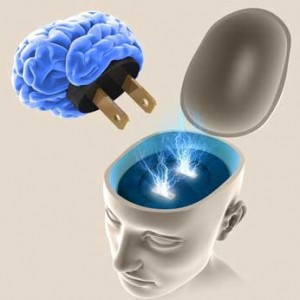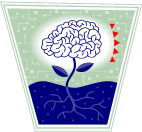Hard Evidence that Meditation Changes our Brains
 Mediation and mindfulness training is a frequent topic on the Next Brain Blog. Over the last several years we have seen studies that show a few weeks of meditation can produce measurable improvement in cognitive function and long-term practice actually makes certain brain regions larger. Now researchers at UCLA report in, Is Meditation the Push-Up for The Brain?:
Mediation and mindfulness training is a frequent topic on the Next Brain Blog. Over the last several years we have seen studies that show a few weeks of meditation can produce measurable improvement in cognitive function and long-term practice actually makes certain brain regions larger. Now researchers at UCLA report in, Is Meditation the Push-Up for The Brain?:
“… that people who meditate also have stronger connections between brain regions and show less age-related brain atrophy. Having stronger connections influences the ability to rapidly relay electrical signals in the brain. And significantly, these effects are evident throughout the entire brain, not just in specific areas.”
Changing the physical structure of the brain to preserve and enhance function and cognitive performance makes meditation a high-value training technique.
Interested to hear from readers that use any form of meditation. What technique do you use? How long have your practice? What Next Brain benefits do you see?
Categories: Cognitive Decline, Memory and Learning, Older Adult, Training Tags: meditation, mindfulness
The Science of Building a Better Brain
 Newsweek did a great job of summarizing the findings from the cognitive enhancement strategies workshop held at the 2010 annual meeting of the Society of Neuroscience. The article, Can You Build a Better Brain? uses the latest neuroscience to differentiate between techniques that work and those that don’t. Techniques for improving brain function and enhancing cognitive performance that have strong scientific support include:
Newsweek did a great job of summarizing the findings from the cognitive enhancement strategies workshop held at the 2010 annual meeting of the Society of Neuroscience. The article, Can You Build a Better Brain? uses the latest neuroscience to differentiate between techniques that work and those that don’t. Techniques for improving brain function and enhancing cognitive performance that have strong scientific support include:
- Drugs that boost dopamine levels such as caffeine
- Regular aerobic exercise
- Meditation training
- Activities that boost mood and confidence
- Action-oriented video games
- Cognitive training software but only for the tasks done using the software
All of these techniques have been covered in the Next Brain Blog. Techniques that don’t appear to have strong evidence include, and I quote:
“Vitamins B6, B12, and E; beta carotene; folic acid; and the trendy antioxidants called flavenoids are all busts, and the evidence for alcohol, omega-3s (the fatty acids in fish), or having a large social network is weak. The Mediterranean diet is associated with a lower risk of cognitive decline, find observational studies, but that hasn’t been confirmed in more rigorous, randomized controlled studies, and no one knows whether the benefit comes from what the diet includes (olive oil, fish, vegetables, wine) or what it excludes (red meat, refined sugars, dairy fat). Statins don’t help, and neither do estrogen or NSAIDs (aspirin, ibuprofen).”
Although some of these have supporting studies they lack a clear causal connection to brain plasticity or other currently understood mechanism of cognition.
Categories: Other Tags: brain training, exercise, games, meditation, mindfulness, Mindset, vitamins
Is a Wandering Mind More Effective?
 About a third of the time we are awake our mind is wandering. We are not focused on the topic at hand, we are zoning out. Not really in a full day dream just having thoughts unrelated to the tasks we are trying to do. We slip in and out of focus rapidly and often. It is worse if we are drinking or are having a craving.
About a third of the time we are awake our mind is wandering. We are not focused on the topic at hand, we are zoning out. Not really in a full day dream just having thoughts unrelated to the tasks we are trying to do. We slip in and out of focus rapidly and often. It is worse if we are drinking or are having a craving.
For those interested in improving cognitive performance and brain function it seems that mind wandering presents a major opportunity.
Even 10% less wandering during the day would mean 30 minutes or so more mental time on task! This puts a premium on using techniques, such as mindfulness, that naturally nudge the wandering mind back on task.
 Unfortunately the case is not that clear. There has been research that suggests a wandering mind is critical to enhance creativity. More recent research even suggests it may improve decision-making. Point being that our mind likely wanders for a reason and that reason is likely essential for high performance.
Unfortunately the case is not that clear. There has been research that suggests a wandering mind is critical to enhance creativity. More recent research even suggests it may improve decision-making. Point being that our mind likely wanders for a reason and that reason is likely essential for high performance.
For a good (and short) article on this topic check out Discovering the Virtues of the Wandering Mind. Interested to hear from readers on their view. Especially interested in any techniques for minimizing it or getting better cognitive performance from it.
Categories: Mental Focus Tags: creativity, mindfulness
Audio CDs on Mindfulness – Do They Work?
 Mindfulness techniques are designed to bring us into the present moment as fully as possible. It involves paying attention on purpose and without judgment. Mastering this type of attentional focus has proven to be a gateway for higher cognitive performance.
Mindfulness techniques are designed to bring us into the present moment as fully as possible. It involves paying attention on purpose and without judgment. Mastering this type of attentional focus has proven to be a gateway for higher cognitive performance.
Several self-instruction techniques for doing mindfulness training have been covered in other posts on the Next Brain Blog. Unfortunately, it can be difficult for beginners to use such techniques on their own. It is best to work with an experienced guide. This can be expensive and inconvenient. One alternative is to try and get such guidance off a CD. But do they really help?
To find out I bought a copy of the audio book Mindfulness for Beginners. It is a $13 two-CD set prepared by Jon Kabat-Zinn a well known leader in the field. The first CD provides an overview of the foundations of mindfulness and the second walks you through five distinct mediations or training exercises. I listened to both CD and then practiced the mediation that seemed most interesting. Although the narration style took some getting use to, the coaching and just plain reassurance was key for making progress.
One point that was particularly important (for me at least) was coaching around what to do as your mind wanders during the mediation.
Dr. Kabat-Zinn was very clear that such wandering is fine. The goal is not to stop it but to gently bring your attention back to the present. You do this by refocusing your attention on the subject of the mediation – eating a rasin in my case – over and over again. Indeed, for the beginner, bringing your attention back to focus on the mediation is the point of the exercise. Bring it back enough times and focusing becomes a habit. I experienced a bit of that! Something I was not able to do working on my own with books.
 I was attracted to the eating mediation because the exercise walks you through looking at, feeling, smelling, hearing, salivating, chewing, swallowing and otherwise sensing a raisin. May sound a bit strange but I can see many uses in my design work for such direct sensory experience. My plan is to try the other mediations and then build one into my daily mind training routine.
I was attracted to the eating mediation because the exercise walks you through looking at, feeling, smelling, hearing, salivating, chewing, swallowing and otherwise sensing a raisin. May sound a bit strange but I can see many uses in my design work for such direct sensory experience. My plan is to try the other mediations and then build one into my daily mind training routine.
I am interested to hear from readers that can recommend other CDs for mindfulness training.
Categories: Books, Mental Focus, Perception, Training Tags: Buddhist, mindfulness
Get Benefits of Long-Term Meditation in Just Days?
 It was about 10 years ago when research studies began to suggests that a little bit of physical activity could be good for you. Taking a short walk or even just climbing a flight of stairs might be heart-healthy. This was a big surprise for many as traditional wisdom was that you must work-out multiple times per week for many weeks to see benefits.
It was about 10 years ago when research studies began to suggests that a little bit of physical activity could be good for you. Taking a short walk or even just climbing a flight of stairs might be heart-healthy. This was a big surprise for many as traditional wisdom was that you must work-out multiple times per week for many weeks to see benefits.
Now the same may be emerging for brain training at least in the area of mindfulness and meditative practice. I am seeing studies that suggest a few days of training may produce what we once thought took months or years. The Science Daily Blog reports one such study, Brief Meditation Helps Cognition:
“Psychologists studying the effects of a meditation technique known as “mindfulness ” found that meditation-trained participants showed a significant improvement in their critical cognitive skills (and performed significantly higher in cognitive tests than a control group) after only four days of training for only 20 minutes each day.”
Specific improvements included increased mental energy, reduced anxiety and improved working memory, visual/spatial processing and executive functioning (attention, planning thinking).
Interestingly, no special training technique was used.
As described in the paper, “participants were instructed to relax, with their eyes closed, and to simply focus on the flow of their breath occurring at the tip of their nose. If a random thought arose, they were told to passively notice and acknowledge the thought and to simply let ‘it’ go, by bringing the attention back to the sensations of the breath.” Subsequent training built on this basic model, teaching physical awareness, focus, and mindfulness with regard to distraction.
Mindfulness training is not as natural as climbing a flight of stairs or taking a walk but clearly it is something we can learn. I am interested to hear from readers that practice mindfulness, especially how they were able to initially learn the technique.
Source: Image of Meditating Man
Categories: Ancient Ways, Executive Function, Mental Focus, Training Tags: meditation, mental energy, mindfulness
Integrative Body-Mind Training Improves Brain Functions in Just Five Days!
 There is growing evidence that a fast-track approach to mediation may in fact produce results in as little as five days. This would be a breakthrough as using mindfulness or mediative techniques to improve your cognitive functioning normally takes months or years.
There is growing evidence that a fast-track approach to mediation may in fact produce results in as little as five days. This would be a breakthrough as using mindfulness or mediative techniques to improve your cognitive functioning normally takes months or years.
The technique is called integrative body-mind training (IBMT) and requires 20 minutes per day for five days. Subjects with no previous training in mediation techniques showed significant improvements in mental focus, mood and stress.
The process involves using a number of techniques together under the guidance of a coach. The seminal article on IBMT, Short-Term Medication Training Improves Attention and Self-Regulation, describes it this way:
“Training in this method is followed by 5 days of group practice, during which a coach answers questions and observes facial and body cues to identify those people who are struggling with the method. The trainees concentrate on achieving a balanced state of mind while being guided by the coach and the compact disc that teaches them to relax, adjust their breathing, and use mental imagery.”
A more detailed description of how this works over a five day period can be found in this Introduction to IBMT written by Dr. Yi-Yuan Tang a pioneer in the field.
I am interested to hear from readers that can recommend a coach, suggest resources or share experiences about IBMT. I’d like to try it and write additional posts for the next Brain Blog.
Source: Image of running man.
Categories: Ancient Ways, Executive Function, Memory and Learning, Mental Focus, Music and Audio, Training Tags: meditation, mindfulness
Want a High Performance Mind?
Combat soldiers, surgeons, ER professionals, Olympic athletes and others that face extreme-stress situations involving judgement must all develop high performance minds to be successful. Cognitive performance in extreme circumstances has been studied closely and training programs and techniques have been developed and tested. How to use these techniques to build a high performance mind will be a frequent topic on the Next Brain Blog.
 For example, The Mind Fitness Training Institute, is in the news for a program they have for training the minds of US combat soldiers. They just completed a pilot study that demonstrated how mindfulness training techniques can improve working memory and affective response (or emotional control).
For example, The Mind Fitness Training Institute, is in the news for a program they have for training the minds of US combat soldiers. They just completed a pilot study that demonstrated how mindfulness training techniques can improve working memory and affective response (or emotional control).
Soldiers in the program start by mastering attentional control and concentration using a mindfulness training technique. A briefing document explains:
“At first, exercises emphasize building concentration by focusing on one object of attention, such as the breath, contact between the body and the floor or chair, or sensations within specific body parts. This single focus of attention is maintained throughout a practice session; when attention wanders, it is returned to the object of attention. Later in the course, exercises require attending to body sensations during movement and “shuttling” the attention between inner sensations andouter experiences (i.e., sights or sounds).”
This technique is used in many other programs that promise to build a high performance mind. An important finding because it tells us:
The first step in developing a high performance mind is to practice attentional control and concentration using a very simple training technique.
And you don’t need to have an extreme-stress job or attend a special training program to get started. Here is what you do:
- Rest comfortably by laying down or sitting
- Close your eyes if you want to
- Focus on your stomach and feel your breathing
- Pay attention to all your bodily sensations in your belly as move through the complete breathing cycle of inhaling and exhaling
- If you mind wanders to another topic or sensation return your attention to your belly and the cycle of breath.
Your only task here is to bring your mind back to the sensation of breathing every time it wonders. Sounds simple but it takes practice. And what you are learning is invaluable – how to control your own mind!
15 minutes per day for a week should produce a noticeable result. At the very least you will have first hand experience in attempting to control you attention in a systematic way. If you try it and please share your experience by leaving a comment.
Categories: Ancient Ways, Manage Emotions, Mental Focus, Training Tags: meditation, mindfulness
Practice Mindfulness to Sharpen Mind and Perhaps Build a Bigger Brain
 Studies have shown that if you spend a lot of time juggling or playing a musical instrument the parts of your brain that supports these activities grows bigger. London taxi cab drivers that spend a decade memorizing elaborate routes experience significant brain changes. These facts support a major premise behind this blog namely, we are far more in charge of the shape, size, longevity and performance of our brain than we realize.
Studies have shown that if you spend a lot of time juggling or playing a musical instrument the parts of your brain that supports these activities grows bigger. London taxi cab drivers that spend a decade memorizing elaborate routes experience significant brain changes. These facts support a major premise behind this blog namely, we are far more in charge of the shape, size, longevity and performance of our brain than we realize.
It would stand to reason that people who meditated extensively should have bigger brains. I have found a few studies that that support this idea but there is not enough data for a firm conclusion. In one study:
“Our data suggest that meditation practice can promote cortical plasticity in adults in areas important for cognitive and emotional processing and well-being,” says Sara Lazar, leader of the study and a psychologist at Harvard Medical School. “
In a second study:
“Using MRI scans the scientists show that there was “significantly larger cerebral measurements in mediators”.
No matter, even if mediation does not grow your brain there have been studies that demonstrate improved clarity of thinking, enhance self-control, reduced stress and self-reported well being. As such it is an important option for improving cognitive performance and will be a frequent topic on the Next Brain Blog.
 Buddhist insight mediation that advocates focusing on sensation rather than our thoughts of sensation seems to produce results. It is similar to the more modern movement of mindful mediation that focuses on “being in the moment”. Finally, there is a third, non-mediative approach to mindfulness that we will explore. It is based on the contemporary work of Ellen Langer and seeks to achieve a heightened state of situational awareness of conscious control over thoughts and actions. Insight mediation, mindful mediation and cognitive mindfulness.
Buddhist insight mediation that advocates focusing on sensation rather than our thoughts of sensation seems to produce results. It is similar to the more modern movement of mindful mediation that focuses on “being in the moment”. Finally, there is a third, non-mediative approach to mindfulness that we will explore. It is based on the contemporary work of Ellen Langer and seeks to achieve a heightened state of situational awareness of conscious control over thoughts and actions. Insight mediation, mindful mediation and cognitive mindfulness.
If you are interested in giving it a try I suggestion action over reading. Try this simple five-step experiment in mindful meditation.
Source: Mindfulness Image
Categories: Ancient Ways, IQ and EQ, Manage Emotions, Mental Focus, Training Tags: Buddhist, meditation, mindfulness
